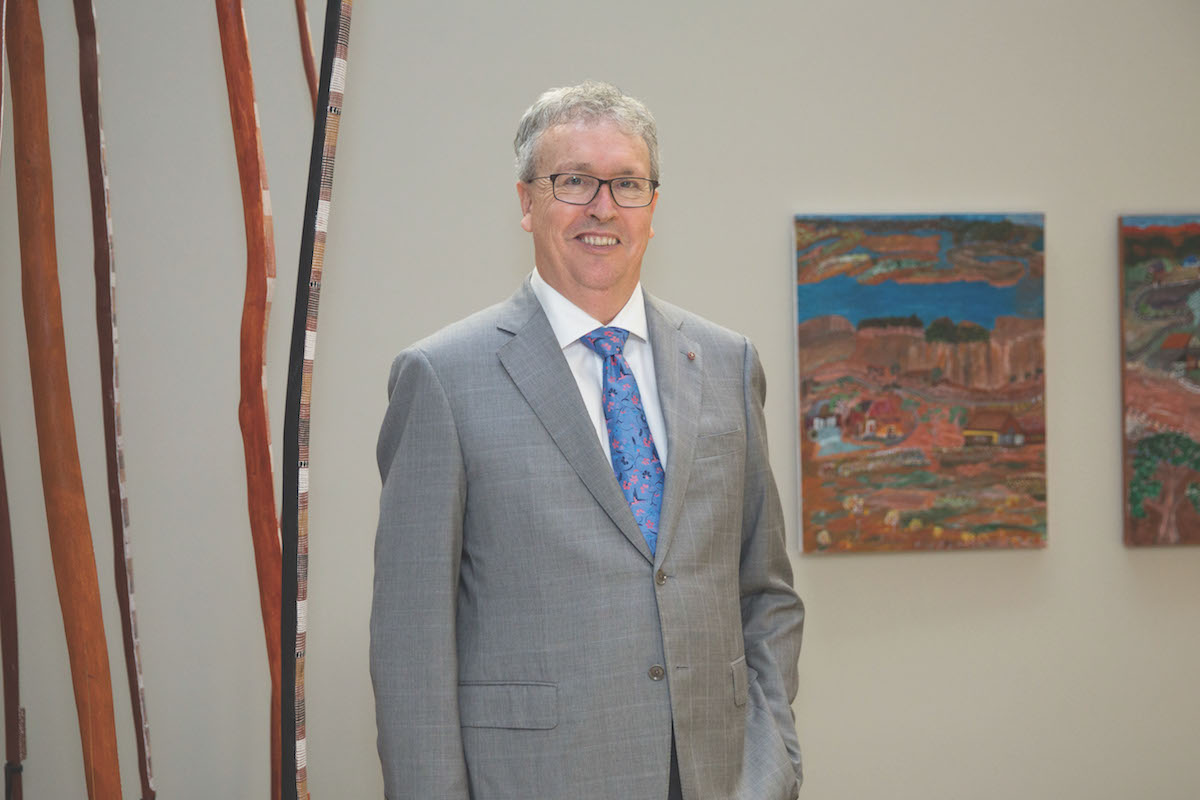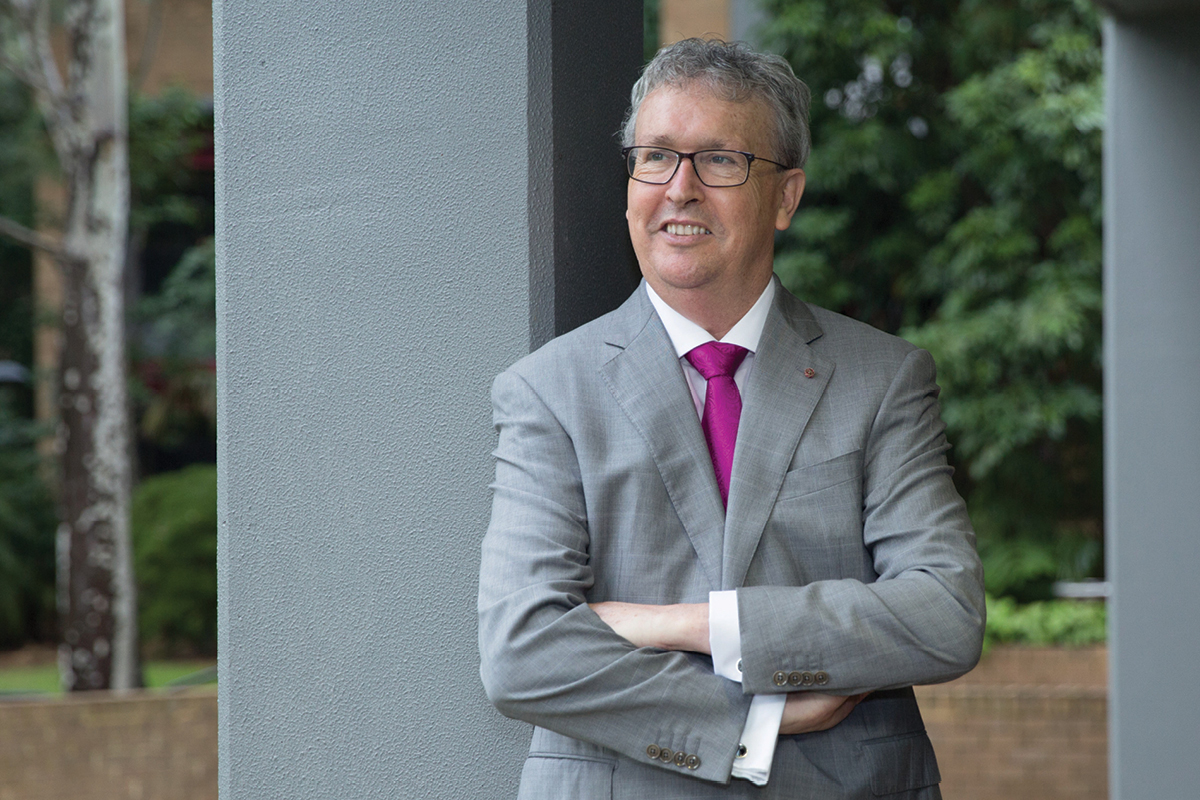Aphids are small, soft-bodied insects that range between 2 and 4 millimetres in size. They come in a variety of colours and traditionally feast on fruit, vegetable and flower plants. While the aphid is a well-known assailant for farmers and their damaged crops, not many people you meet at a barbecue would be able to tell you much about it – except Professor Paul Wellings, that is.
Born in Nottingham, UK, in 1953, and a graduate of 3 of the world’s top-ranking research universities (King’s College, Durham and East Anglia), Paul has spent countless hours researching aphids, writing thousands of words detailing the specifics of these little bugs’ life cycles and growth development, foraging activities and breeding habits, and the threat their kind are to Australia’s flora and fauna.
Professor Paul Wellings, entomology expert
An interesting quirk to be sure, but not one without purpose for Paul, who is currently serving his second term as the vice-chancellor for the University of Wollongong. His research into this little, lesser known creepy-crawly helped Australia to better understand its entomology and ecology throughout the 80s and 90s, when Paul spent 14 years with the Commonwealth Scientific and Industrial Research Organisation (CSIRO), even becoming chief of its Entomology Division in 1995.

Having worked for CSIRO and within the bureaucracy of Canberra, that was seen as a distinctive and advantageous set of skills.
Between 1997 and 1999, he was seconded to science policy in Canberra, serving as the head of the Innovation and Science Division for the Department of Industry, Science and Resources. “I had responsibilities for the division that ran Australia’s science and innovation policy, so I’ve also done a lot of work with Biotechnology Australia and the Cooperative Research Centres Association on the development of emerging and disruptive technologies,” says Paul.
He then returned to CSIRO as deputy CEO, where he remained until 2002, when he was whisked back to the UK to take up a vice-chancellor role with the University of Lancaster. “When I was asked to take the role in the UK at Lancaster, they wanted someone who was going to be more outward looking than the standard vice-chancellor model, and I think having worked for CSIRO and within the bureaucracy of Canberra, that was seen as a distinctive and advantageous set of skills,” says Paul. “The hope was that I would be able drive more industry engagement and more interaction with the departments in London.”
The University of Wollongong proves an attractive opportunity
The researcher and academics administrator went on to serve Lancaster University for a decade. Despite ongoing uncertainty in the sector, Paul has never been a stranger to change, at least the positive variety. A key feature of Paul’s time with Lancaster was to internationalise it, establishing new partnerships with Malaysia and India to set up overseas campuses, as well as strengthening its programs for international students.
“The other really big thing we did was to drive the medical side of Lancaster. When I started in 2002, there was no medical element. We were able to establish a new medical school in the north of England,” explains Paul.
Paul’s roles in research & higher education include:
-
Deputy CEO of CSIRO
-
Director of the Australian Nuclear Science and Technology Organisation (ANSTO)
-
Director of the Australian Centre for International Agricultural Research (ACIAR)
-
Director of the Cumbrian Rural Regeneration Company
-
Board member of Universities UK (UUK)
-
Chair of UUK’s International and European Policy Committee
-
Board member of Higher Education Funding Council for England (HEFCE)
-
Chair of HEFCE’s Research Committee
After spending so many years Down Under prior to his Lancaster appointment, the opportunity to come back to Australia and become the new vice-chancellor for the University of Wollongong (UOW) was a very attractive opportunity for Paul and his wife.
Paul’s chance came when former VC Gerard Sutton announced his retirement in 2011, and today Paul is serving his sixth year with the Illawarra-based institution. “I had an open appointment to the UK but knew at some point we were going to move back to Australia, and I was keen to do that,” he says. It was also clear early on that he would be joining a well-oiled machine that didn’t require too much upfront maintenance. “UOW was in great shape when I took over, thanks to the efforts of the two previous vice-chancellors.”
A vision to expand UoW’s footprint
Nevertheless, Paul still came armed with big plans for UOW – a vision to expand the university’s international footprint, as well as opening two new, smaller locations in Sydney’s CBD and western suburbs. He also sought to beef up the variety of education programs with additional health and medical course offerings. The university balance sheet was restructured to free up resources that could then be reinvested into a new $80-million Molecular Horizons medical research centre, set to boost drug design capability and disease research.
The culture here is very action-oriented.
“This will give New South Wales a hugely distinctive asset for businesses interested in things like molecules and drug design to engage with the university sector,” says Paul. There are also plans for a series of new infrastructure projects both in Australia and overseas, including construction of arts and social sciences buildings at the Wollongong campus. “That will modernise the teaching and learning facilities for the arts programs that we run.”
These developments were managed in quite a stark contrast to Lancaster, says Paul, due to UOW’s strong engineering base. “It’s interesting having moved from one management environment where people would say, ‘Why do we need to do that?’ to an engineering environment which is, ‘How do we do it effectively?’ The culture here is very action-oriented,” he says.
Providing opportunities for the Illawarra region
Paul has also sought to use the university as a platform to drive new industries and career opportunities in the Illawarra region, which has suffered an economic downturn due to struggling local coal and steel industries. “The biggest trend I see today is the willingness of this generation of students to take risks in a way that previous generations haven’t. A lot of them are thinking they may well have to build their own enterprise and be entrepreneurial. We have a new business accelerator here that was funded with the help of the New South Wales government, and it has already created 65 spin-off companies with 1.2 million customers in total.”
The biggest trend I see today is the willingness of this generation of students to take risks in a way that previous generations haven’t.
Another ongoing challenge Paul hopes to address is the growing affordability issues plaguing many students today. “We’re starting to see the cost of living becoming more difficult for students to sustain. Over the past decade, many more students have had to hold down part-time jobs while studying at university, and there’s a trend towards students taking up to twice as long to complete their degrees because they’re stretching out their courses so they can make time to work.”
In all his time in academia, however, Paul says he has one major gripe about the industry. “I hadn’t ever expected this, but we seem to have attracted a lot of attention from the media in recent times due to people tinkering with policy; the government has been modifying things for 25 years,” he says. “I want universities off the front page of newspapers, and for all of us to have a little more certainty about what Australia wants of its university sector.”

